MAKING FRIENDS AS AN ADULT
You Can’t Make Old Friends. This is the title of a duet with Dolly Parton and Kenny Rogers. Even if you are not a fan of country music, the sentiments imparted by the lyrics speak to a universal truth for all of us; friendships take time and energy to grow. It is important to nourish the relationships we have, but sometimes we experience shifts in life that necessitate seeking out new friends, and no matter our age, that energy will almost always be a good investment.
As we grow older, and our lives become more complicated, it can be challenging to maintain meaningful connections with others outside of our immediate circle, especially when we often feel like we are just barely sustaining our own needs. Busy work schedules, family responsibilities, and other obligations can often make it feel very difficult to cultivate new friendships and deepen existing ones.
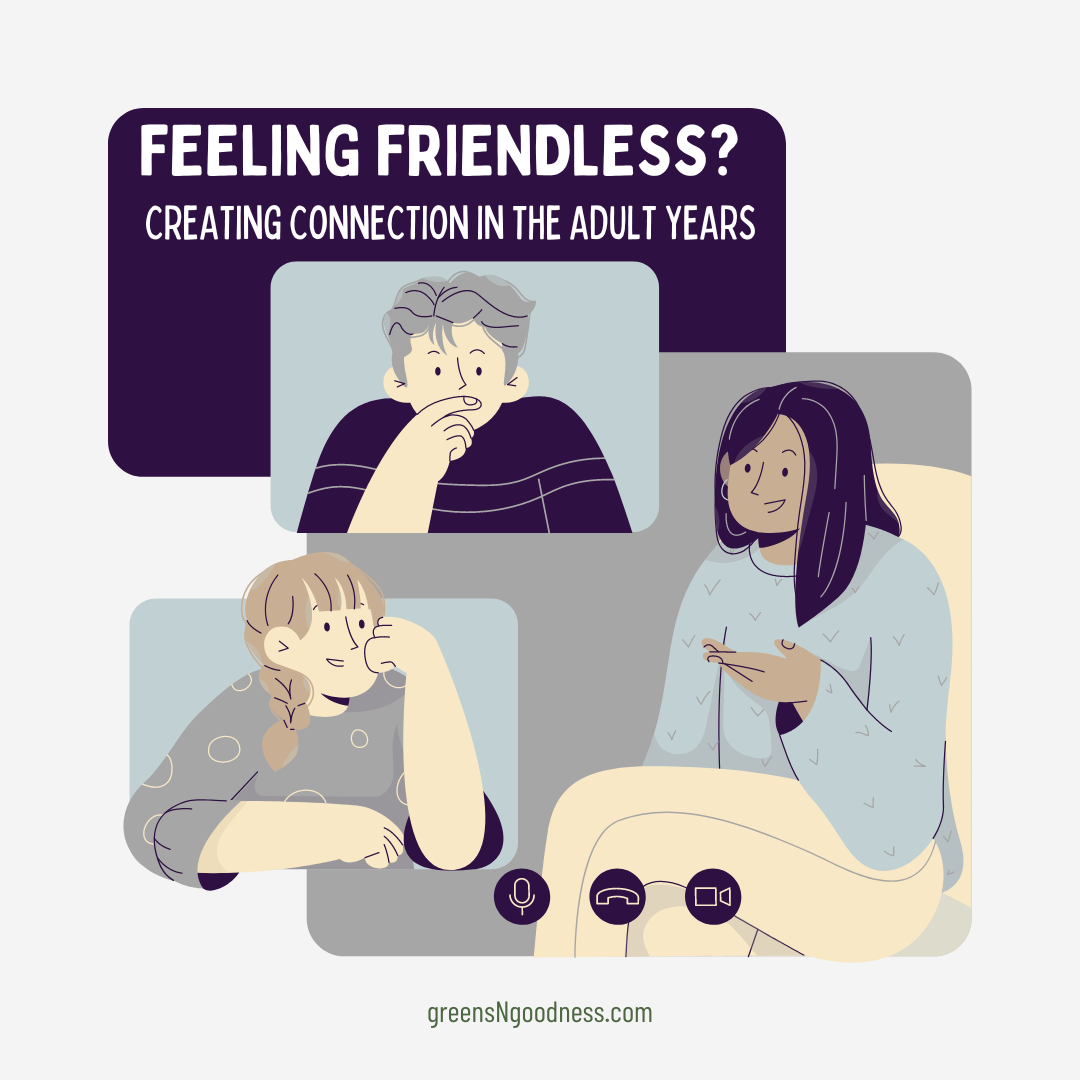
FRIENDSHIP MATTERS
Despite these challenges, building and nurturing relationships with others is an essential part of our lives as adults and is foundational to our quality of life. From providing support in tough times to offering a shoulder to lean on, friends play a crucial role in our well-being and overall happiness.
As our lives change, our circle of friends will likely expand and contract, ebbing and flowing with stages of life. It is important to remember that it will take intention to stay connected with those we care about, or to find new friendships, based on our current life circumstances.
Though the study of friendship is still evolving, it is not surprising that findings report that the higher value a group or individual places on friendship, the more often it is associated with better health markers, even in cases where cultural or environmental contexts are typically associated with lower well-being, such as countries with high income inequality or individualism (1). This points to the likelihood that, no matter what your environment, creating connection with others will provide benefits to your well-being.
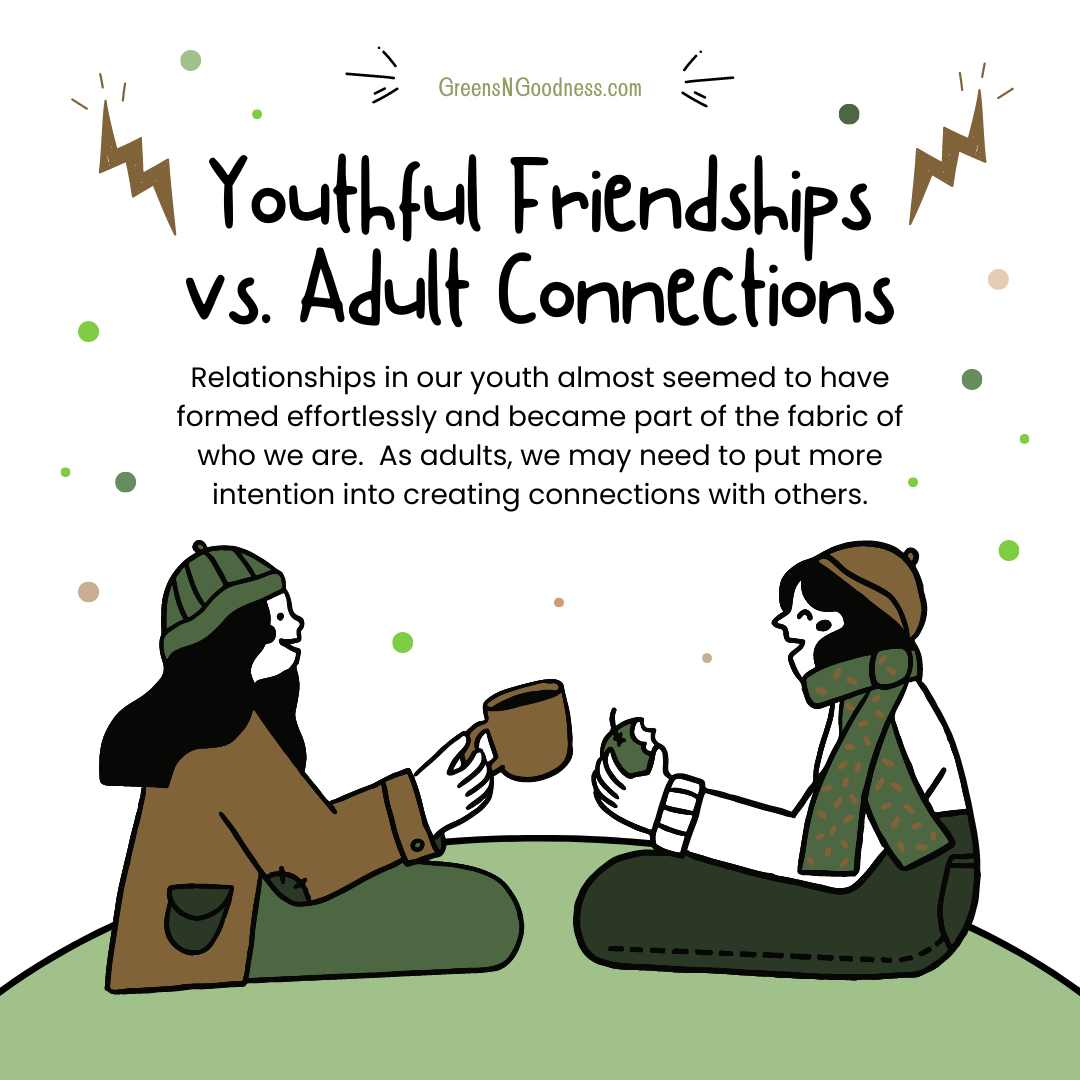
THE EASE OF YOUTHFUL FRIENDSHIPS
Undoubtedly, there is a sort of timeless connection we have with the friends of our youth and young adulthood. The opportunities for creating connection in that stage of life are abundant for most people, with activities focused around peer groups and parents often facilitating our connections in the early years. Those youthful relationships almost seemed to have formed effortlessly and became part of the fabric of who we are.
But, on the flip side of the friendship coin is another sort of connection; one forged from intention, from the maturity of our adult perspective. Still, as we get on in life and become preoccupied with all the tasks that comprise adulthood, it is easy to let creating connection with others fall to the bottom of our priority list. Many of us are just scrambling to just keep pace with day-to-day living and the thought of putting a focus on rekindling old friendships or fostering new ones seems fraught with many challenges.
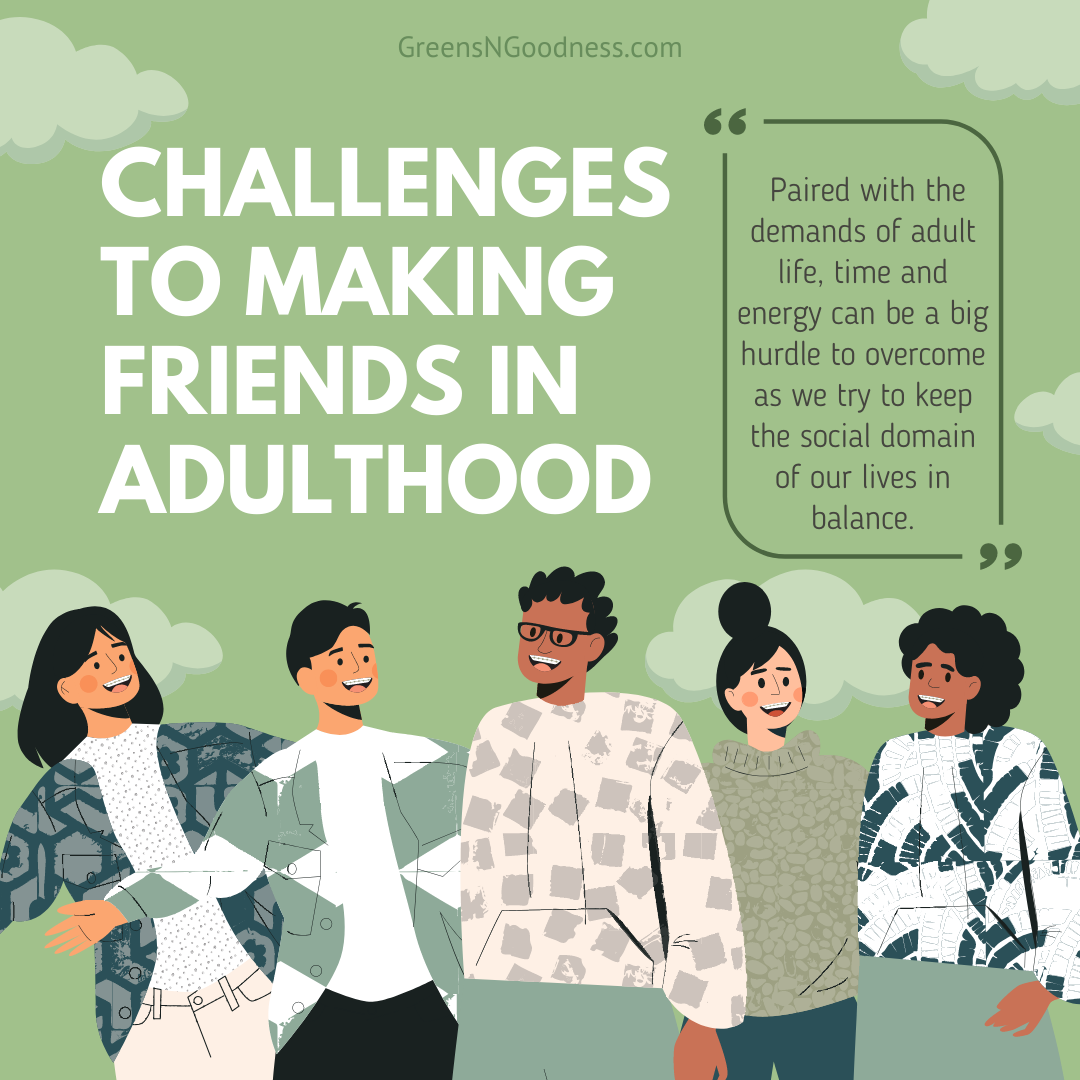
CHALLENGES TO MAKING FRIENDS AS AN ADULT
Time is most often going to be one of the biggest challenges to creating connections as an adult, as leisure time can become sparse. Paired with the demands of adult life, time and energy can be a big hurdle to overcome as we try to keep the social domain of our lives in balance. Not to mention, as we get older, our priorities and interests often shift, making it more difficult to find common ground with long-standing social circles.
The opportunities to spend endless hours just chatting and “hanging out” in our youth, have been replaced by commutes, careers and an array of other energy-draining endeavors, often leaving friendship on the periphery of our focus. Our lives as adults become more complex, sometimes leaving little energy to maintain meaningful connections with others, whether it be cultivating new friendships or deepening existing ones.
For me, as my kids got older, and I stopped needing to drive them everywhere, I found my friendship circle shifted. For a while, it felt nice to be doing less chauffeuring, but I started to notice I was feeling less social without those regular connections with other parents.
Once I was aware of this shift, and that I was missing more frequent interaction with friends, I took it upon myself to initiate occasional check-ins with the people with whom I wanted to keep in touch, even if it was just virtually.
Additionally, I made efforts at creating connection with new people, based around my own interests. I realized I needed to prioritize friendship for my own sake, not just as a byproduct of my kids’ activities. Otherwise, I felt the impact on my emotional health.
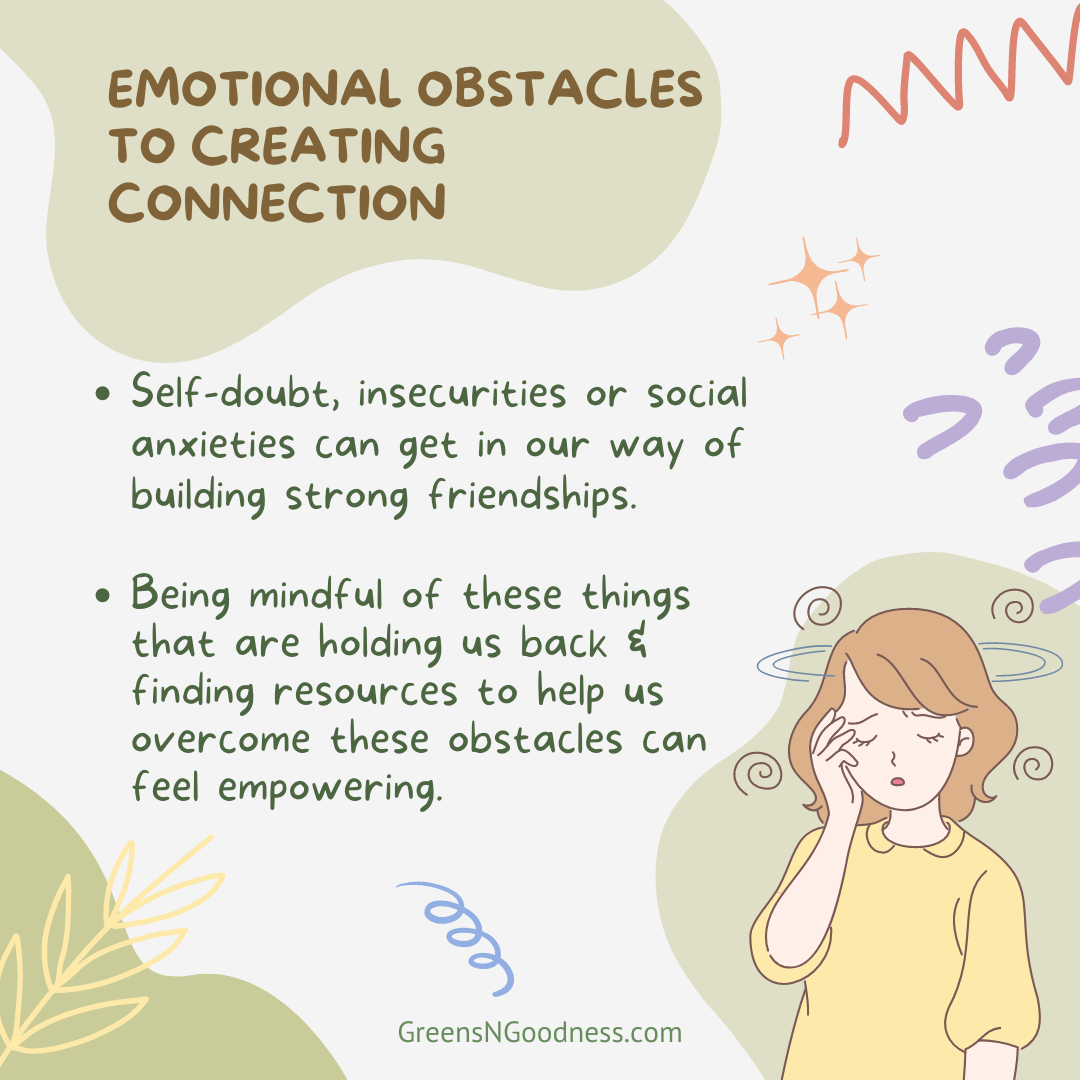
EMOTIONAL OBSTACLES TO CREATING CONNECTION
Additionally, along with changing circumstances, an emotional component might come into play in our efforts to stay connected, finding us struggling with self-doubt, insecurities or social anxieties, that might get in the way of us reaching out to build new friendships with others. Taking time to be mindful of these things that are holding us back from “putting ourselves out there,” and finding resources to help us overcome these obstacles can feel empowering.
It could be debated that modern day communal structures have eroded to the point where even our high speed Internet connections cannot always facilitate the real-life kind of connections most of us crave. But even understanding how we got here, societally and individually, probably wouldn’t make you feel any better right now, if you’re feeling your life is lacking in the social department. So, what to do?
The reality is, if you have made it to adulthood and find that your friendships have shifted, your extended family is at a distance, and you have lost your sense of community, it is going to require conscious effort to plug back into the energy of real-life connections and nurture a circle of friends, old or new, into your next chapter of life.
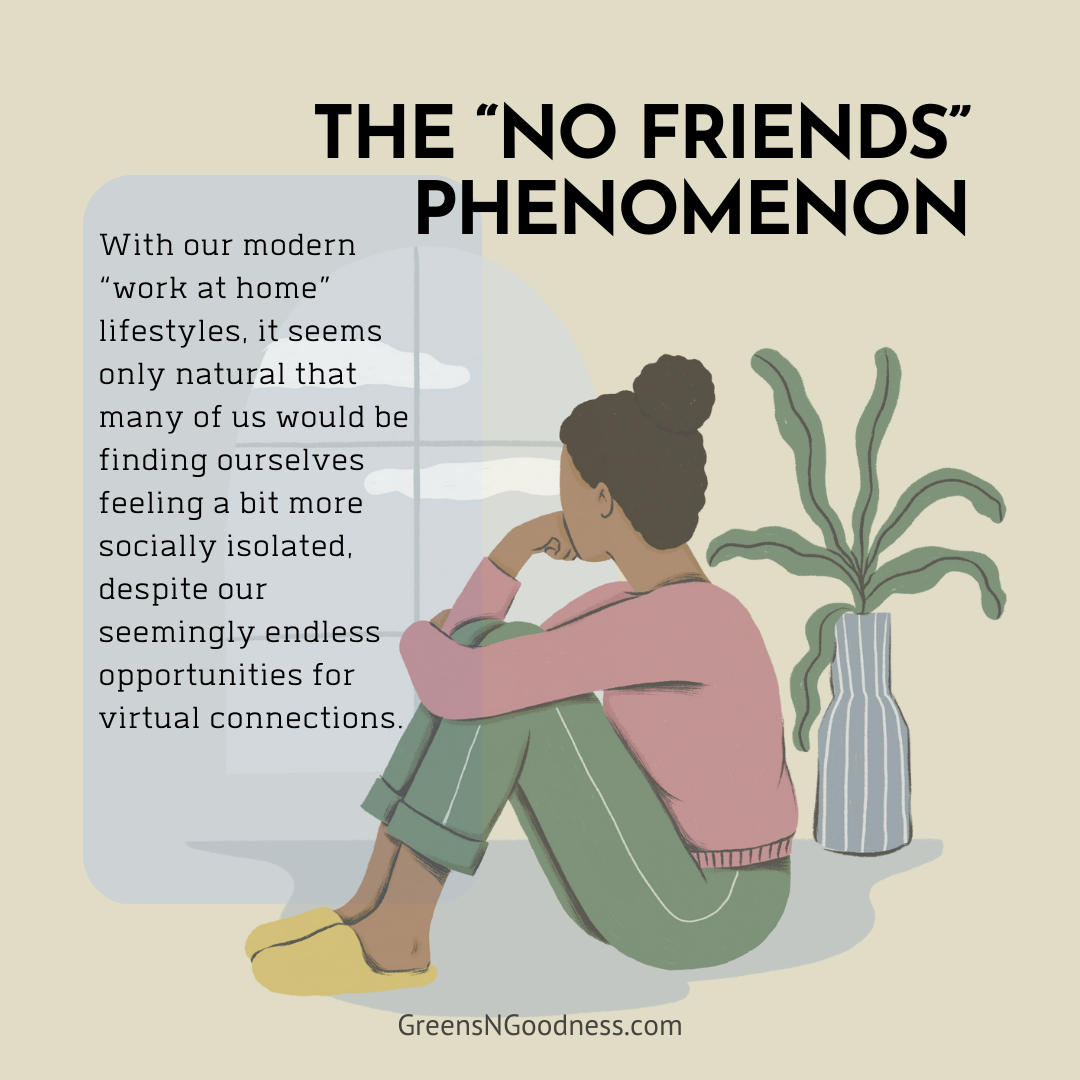
THE “I HAVE NO FRIENDS” PHENOMENON
In your efforts to figure out the solution to the social slump you might be experiencing, you may have found yourself surfing around on-line, looking for inspiration for how to make new friends as an adult. In this process, you might have stumbled across a seemingly large catalog of “I Have No Friends” YouTube videos. I know this type of content started making its way into my consciousness in recent years, so I suspect the algorithm thinks I’m feeling lonely… or just very interested in the dynamics of friendship.
Nonetheless, the demographic of these lonely video creators seems to be adults from all walks of life, though those in their 20’s and 30’s seem to make up the bulk of the contributions. This offers pause for thought. In a world where we are more connected than ever, how does this happen? With so many ways to find “our people” and connect online, how did this epidemic of loneliness take hold?
Well, as we previously touched upon, there are larger societal issues at play that obviously have both aided, and hindered, creating connection with others in the modern world. And, of course, with the more recent “work at home” lifestyles many of us have adopted, and maybe subsequent geographic moves, as as a result of our untethered employment, it seems only natural that many of us would be finding ourselves feeling a bit more socially isolated, despite our seemingly endless stream of Zoom meetings!
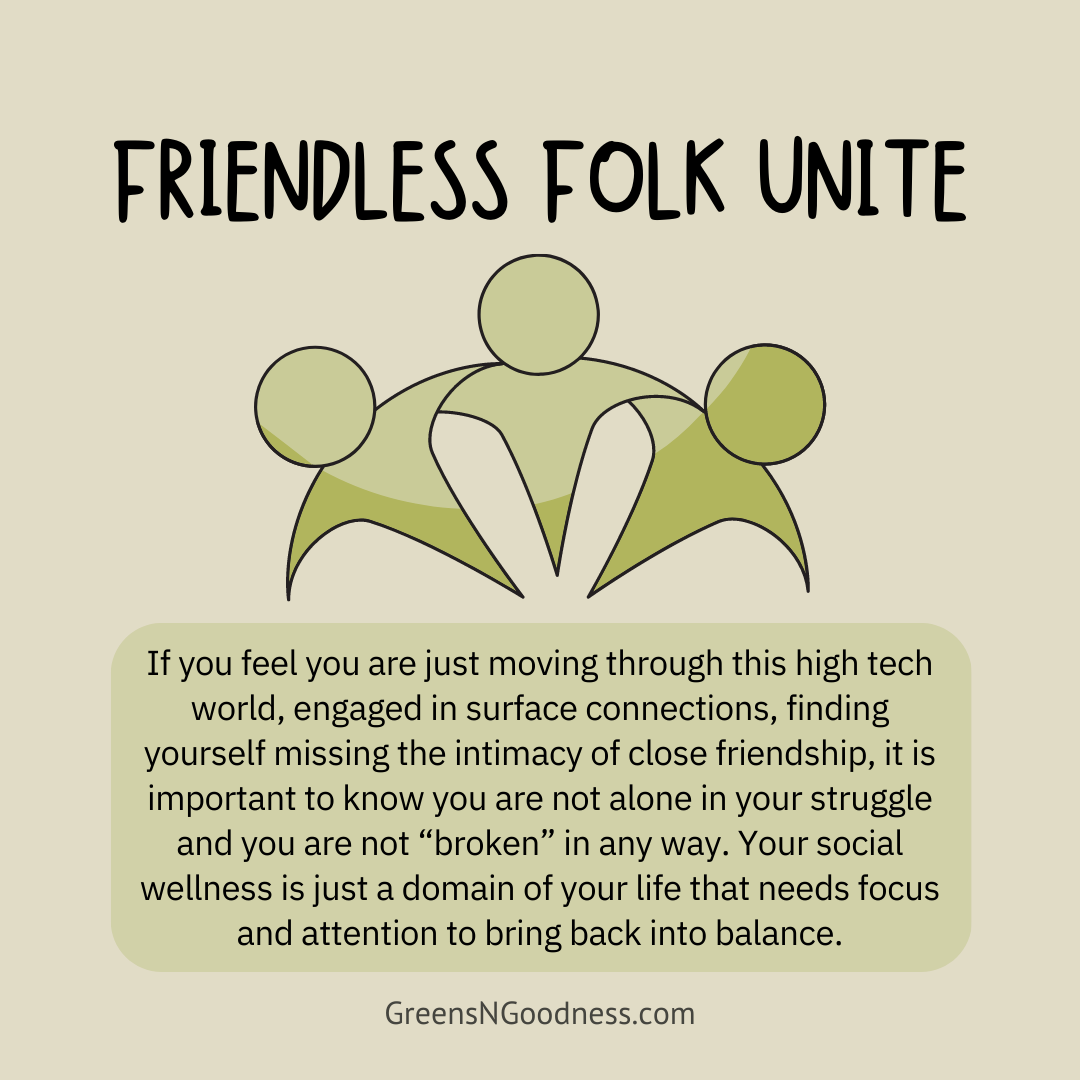
FRIENDLESS FOLK UNITE
Still, the fact that so many adults, despite having a lot of people in their lives, are feeling they lack friendships with any real depth, probably speaks to our collective attention span. Just as with romantic partnerships, creating new friendships requires an investment of time and energy, and intention from all parties to make it work! Investing your time in relationships will likely have a high return on investment.
If you fall into this category of “friendless folk,” just moving through this high tech world, engaged in surface connections, finding yourself missing the intimacy of close friendship, it’s important to know you’re not alone in your struggle and you are not “broken” in any way. Your social wellness is just a domain of your life that needs focus and attention to bring back into balance.
If you are experiencing negative emotions surrounding creating connection with others, or depression and/or anxiety surrounding this topic, those feelings are most likely not going to help you move in the direction of healthy new friendships. So, take a moment to collect yourself and take stock of your resources. If finding a good therapist is not an option for you, seek out (or create) a support group focused on social challenges in the modern world. Simply acknowledging that you’re not alone in your struggle, and asking for help, can be a catalyst towards change.
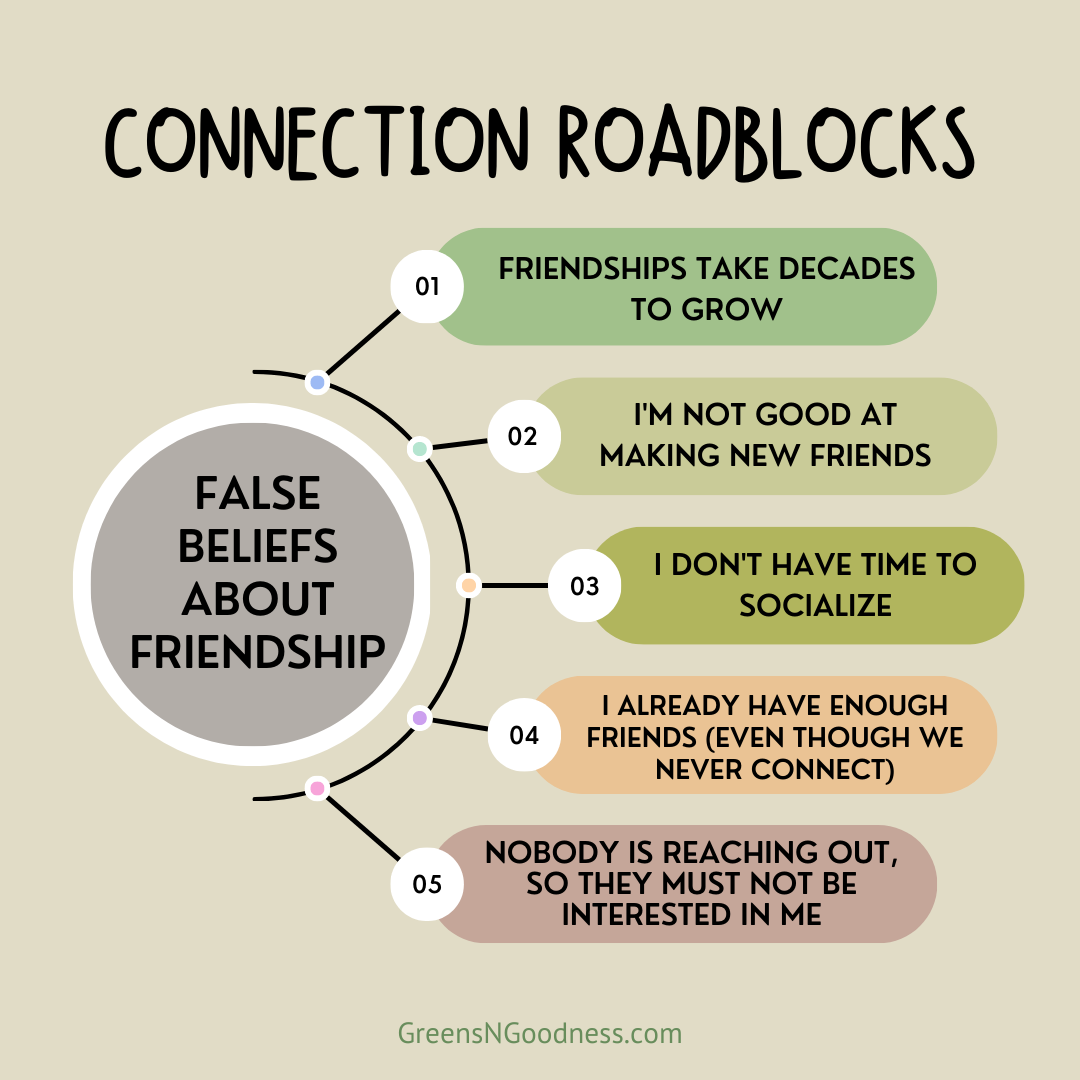
CONNECTION ROADBLOCKS – FALSE BELIEFS
- Meaningful friendships take decades to cultivate
- Making friends as an adult requires a skill set I do not possess
- I don’t have the time to invest in finding friends
- I already have enough friends, even though I’m not feeling very “connected” to them.
- The people in my life aren’t reaching out to connect with me, so they must not be interested.
Here is where we can get trapped by “connection roadblocks,” otherwise known as our false beliefs or unrealistic expectations of friendship. For example, we might feel that friendships take a long time to build, or self-doubt and insecurities have us thinking that making friends is too difficult. We might even feel that we just don’t have time to invest in finding friends amongst the backdrop of our current routines and primary relationships.
Whether we have a base of long-time associations that seems to have “fizzled out,” or we are looking to make new friends, as adults, we can just get lazy in our efforts to reach out to those around us in our busy day-to-day lives. However, there is great value in creating connection, old and new, and the effort will almost always have more pros than cons.
I know I am guilty of buying into some of these false beliefs throughout my adult life, but my antidote to this has always been to remember that I am master of my own ship, and to be open to friendships, I have to get my ship to the port for others to get on board. This might take battling some internal storms, and some navigational challenges, to position myself where I need to be. But, it beats being lost at sea, alone.
Despite the obstacles, metaphorically and practically speaking, building and nurturing relationships is vital to our wellness as adults, from having support in the tough times, to someone to share things with in the good times. No matter how independent and strong one might feel on their own, friendship plays a crucial role in our mental health and overall happiness.
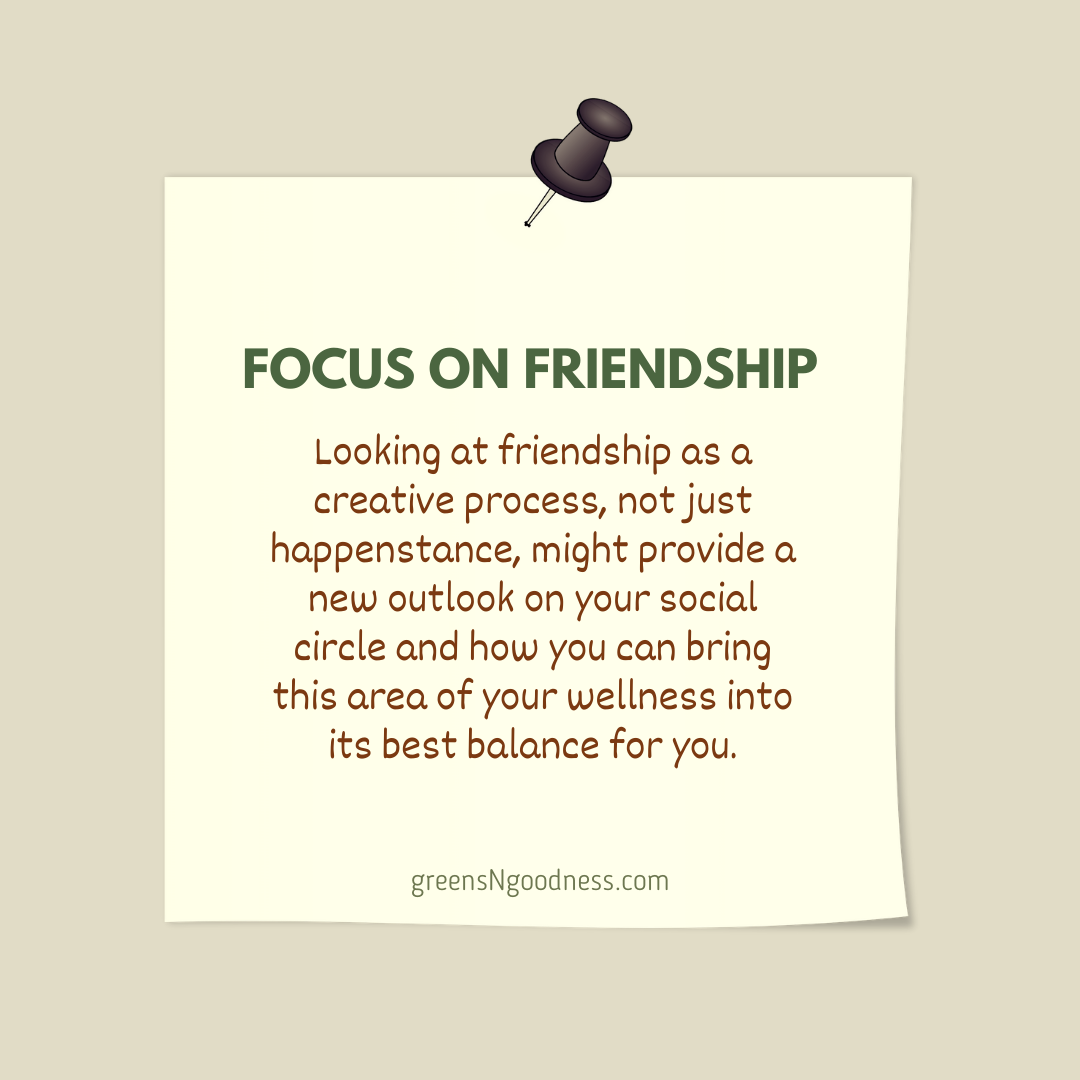
FOCUS ON FRIENDSHIP
So, when your circle of old friends is fading, far away, or needs supplementing, it might be time to add a little focus and intention to friendship and creating connection in your life. There are countless studies and books on the importance of relationships in our life, so that is basically a given. But, recognizing that friendship is a creative process, not just a happenstance, might provide a new outlook on your social circle and how you can bring this area of your wellness into its best balance for you.
Recognizing that creating connection, or building meaningful relationships with others, is a vital part of our health and wellness as adults is the first step towards assessing our current social life and deciding how we would like our friendship circle to look as we move into the next chapter of our lives.
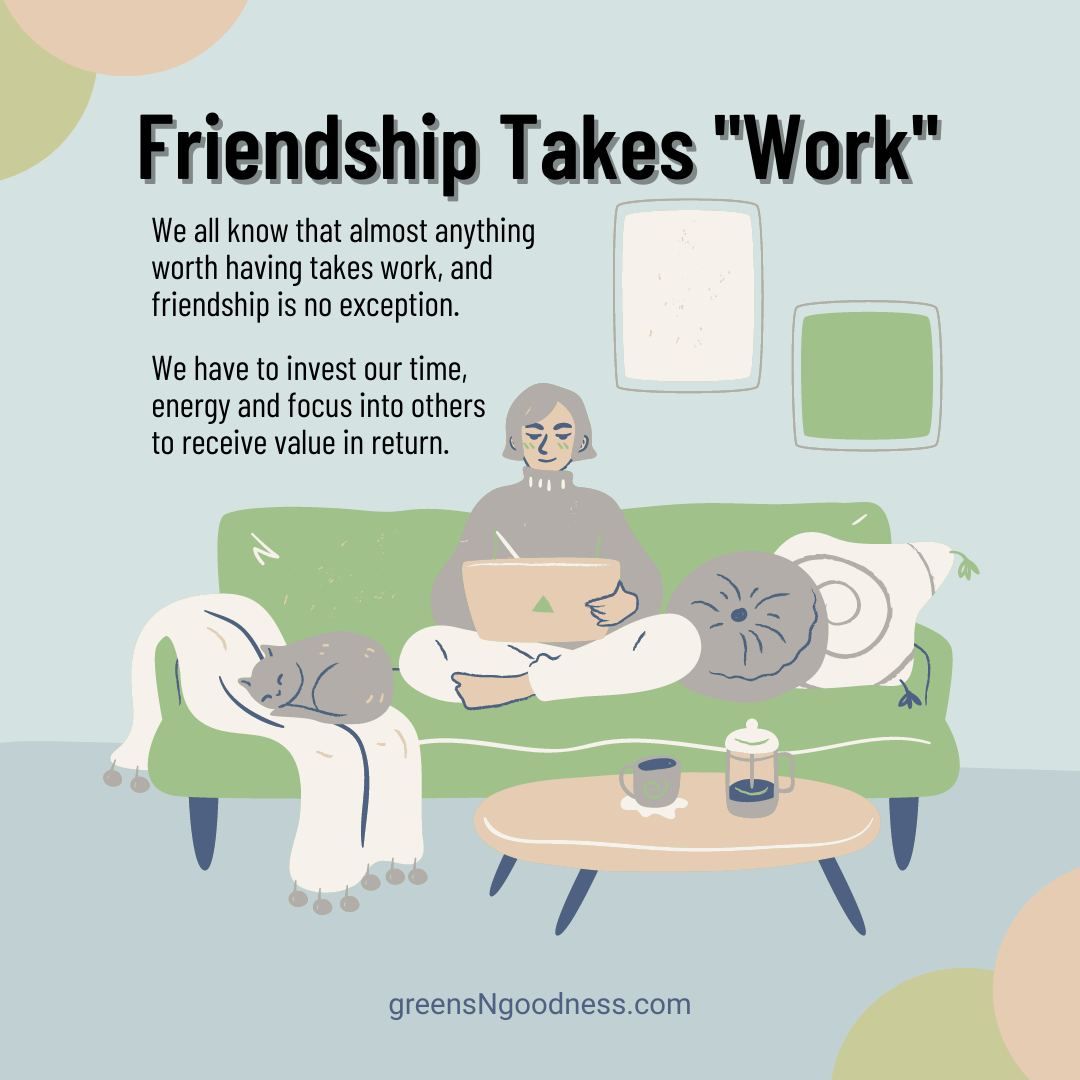
TAKING ACTION TOWARDS CREATING CONNECTION
Of course, simply acknowledging the need for change, while important, needs some action behind it to actually move towards building stronger relationships with those around you, or seeking out new avenues for creating connection. It is easy to get stuck in the feeling that making friends should be easy, and that if we have to work at it too hard, it is not a genuine connection. But, we all know that almost anything worth having takes work, and friendship is no exception. We have to invest our time, energy and focus into others to receive value in return.
“A ubiquitous strain of twenty-first-century culture is infecting our gatherings; being chill. The desire to host while being non-invasive.” (2) While there is a time and place for being “chill” or not take things too seriously, this approach could be a pitfall in the friendship-building process. Even though we would like to think things will “just happen” if there is the right chemistry between people, that’s just not always the case, especially as we get older. So taking your role as a host, or social coordinator, seriously is likely to show other people that you value creating connection, and that you are willing to put forth real effort to put people at ease and build authentic relationships.
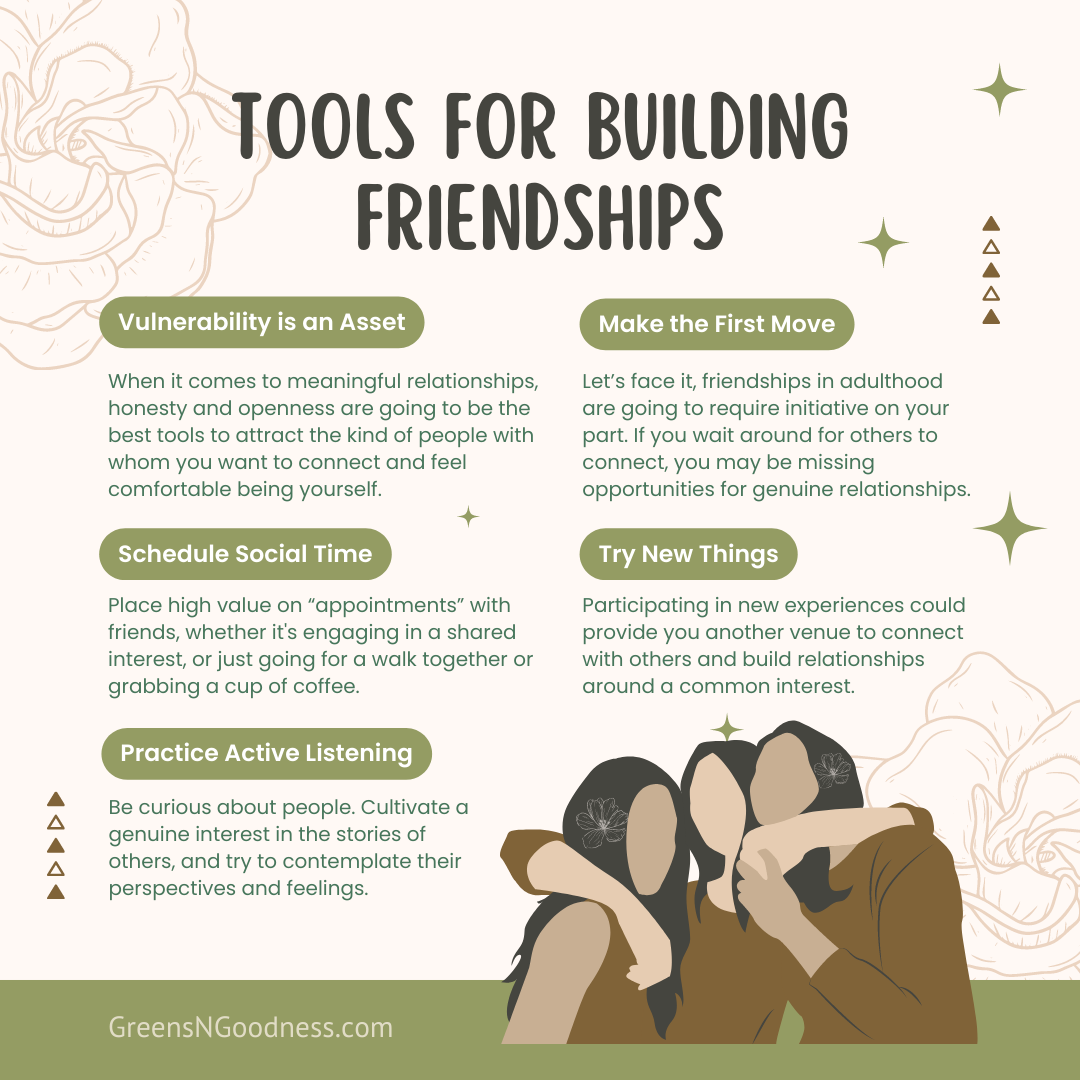
TOOLS FOR BEING A GOOD FRIEND
As you try to put some action behind your intention to create new friendships, here are some tools to consider.
Vulnerability is an asset. While in many arenas of life, being vulnerable can be seen as a weakness, when it comes to meaningful relationships, honesty and openness are going to be the best tools to attract the kind of people with whom you can connect and feel comfortable being yourself. Thus, share your thoughts and feelings about friendship openly, including the challenges and struggles you may have faced, as well as, what you have to offer as a good friend. Of course, with vulnerability comes risk. You’ll need to make peace with rejection if someone does not reciprocate your efforts. Still, be proud of yourself for your honesty and good intentions towards creating connection, and find the lessons in the exchange that you can bring to the next relationship.
Schedule in Social Time. Unless you are fortunate enough to have a livelihood that comes with a built-in friend base, or a huge extended family, you are likely going to have to put some effort into creating time to connect with others.
While we might like to think good relationships will “just flow,” and time will naturally avail itself for us to connect, with our busy adult lives, full of must-do’s and responsibilities, the likelihood of time and energy aligning, on a regular basis, is slim. Socializing is likely going to require intent and planning, so schedule it in, and place high value on those “appointments,” whether it’s engaging in a shared interest, or just going for a walk together or grabbing a cup of coffee.
Listen. While you may think you are a “good listener,” take a minute to consider whether you are ACTIVELY listening to others, or simply contemplating what you want to say. Be curious about people. Cultivate a genuine interest in the stories of others, and try to contemplate their perspectives and feelings. This practice will provide opportunities for deeper insights, help your friends feel heard and understood, inspiring them to do the same for you.
Make the First Move. Of course, we’ve all heard this advice related to dating and romantic relationships, but let’s face it, friendships in adulthood are going to require initiative on your part. Reaching out to others, with the desire to build relationships is not always easy, and if you wait around for others to express interest in you, you may be missing opportunities for genuine connection. It is important to share your thoughts and feelings and be intentional about your desire to expand your friendship circle. Your honesty will allow others to more openly share their needs and let you know where to actively put your energy.
Try New Things. There’s no doubt that we often find comfort in ruts, doing the same things, over and over, comforted by the consistency of results. But, when those results become more of a downer than a comfort, it’s time to mix things up.
Participating in new experiences could be a jumpstart for your social life, giving you another venue to connect with others and build relationships around a common interest. Try taking a class, joining a club, starting a MeetUp group around your own interests, or volunteering somewhere that your talents and skills could be useful. In the process, you can meet like-minded people, while providing yourself with new experiences and a potential creative outlet.
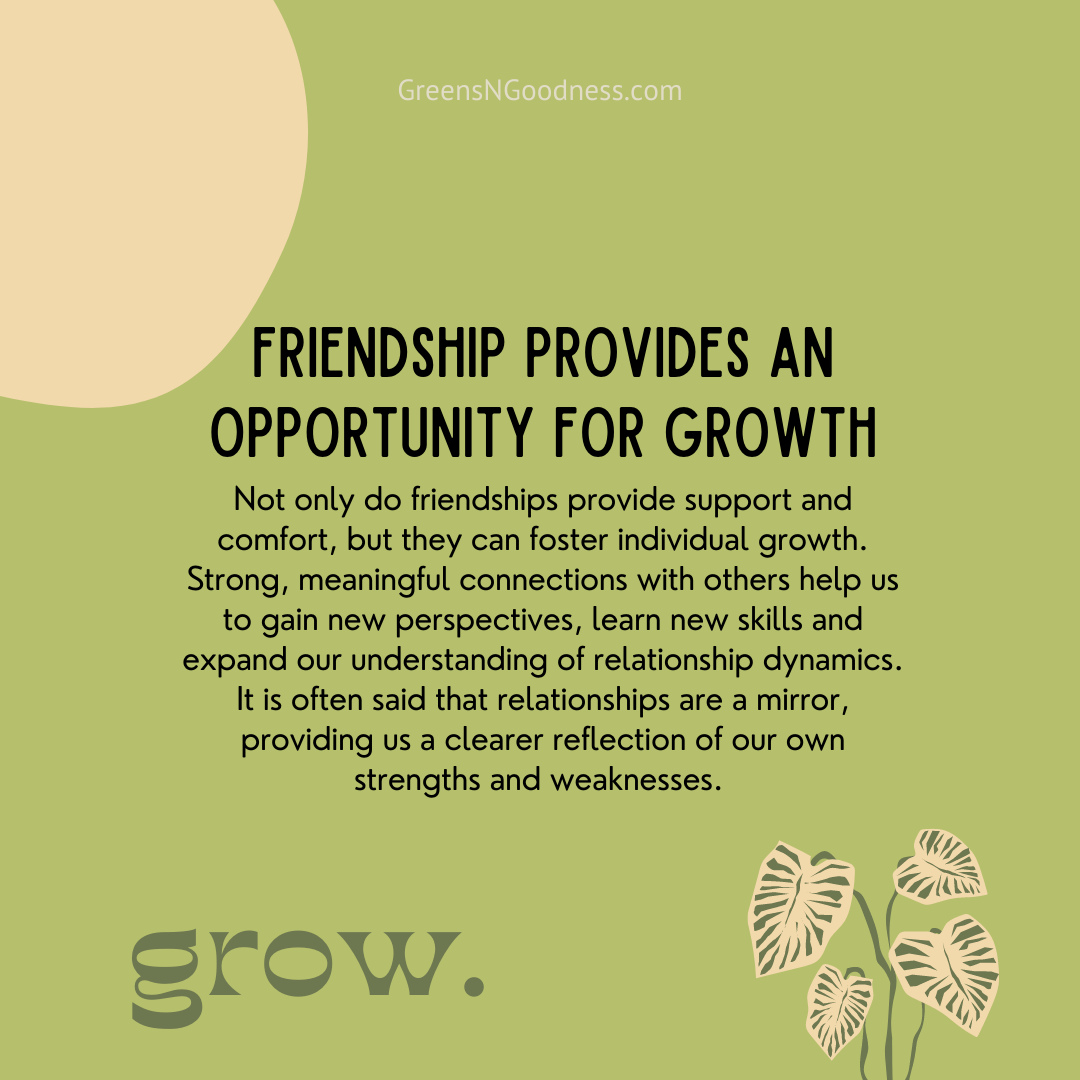
OPPORTUNITY FOR GROWTH
Not only do friendships provide support and comfort, but they can foster individual growth. Strong, meaningful connections with others help us to gain new perspectives, learn new skills and expand our understanding of relationship dynamics. It is often said that relationships are a mirror, providing us a clearer reflection of our own strengths and weaknesses. If we pay attention, these reflections can be an opportunity for growth.
Seeking to expand our friendship circle can also bring new opportunities for learning, professional development, new experiences, and a network of people and ideas to which we might not be exposed otherwise. In turn, we also have a unique take on the world and can bring new insights to the table for other people, as well.
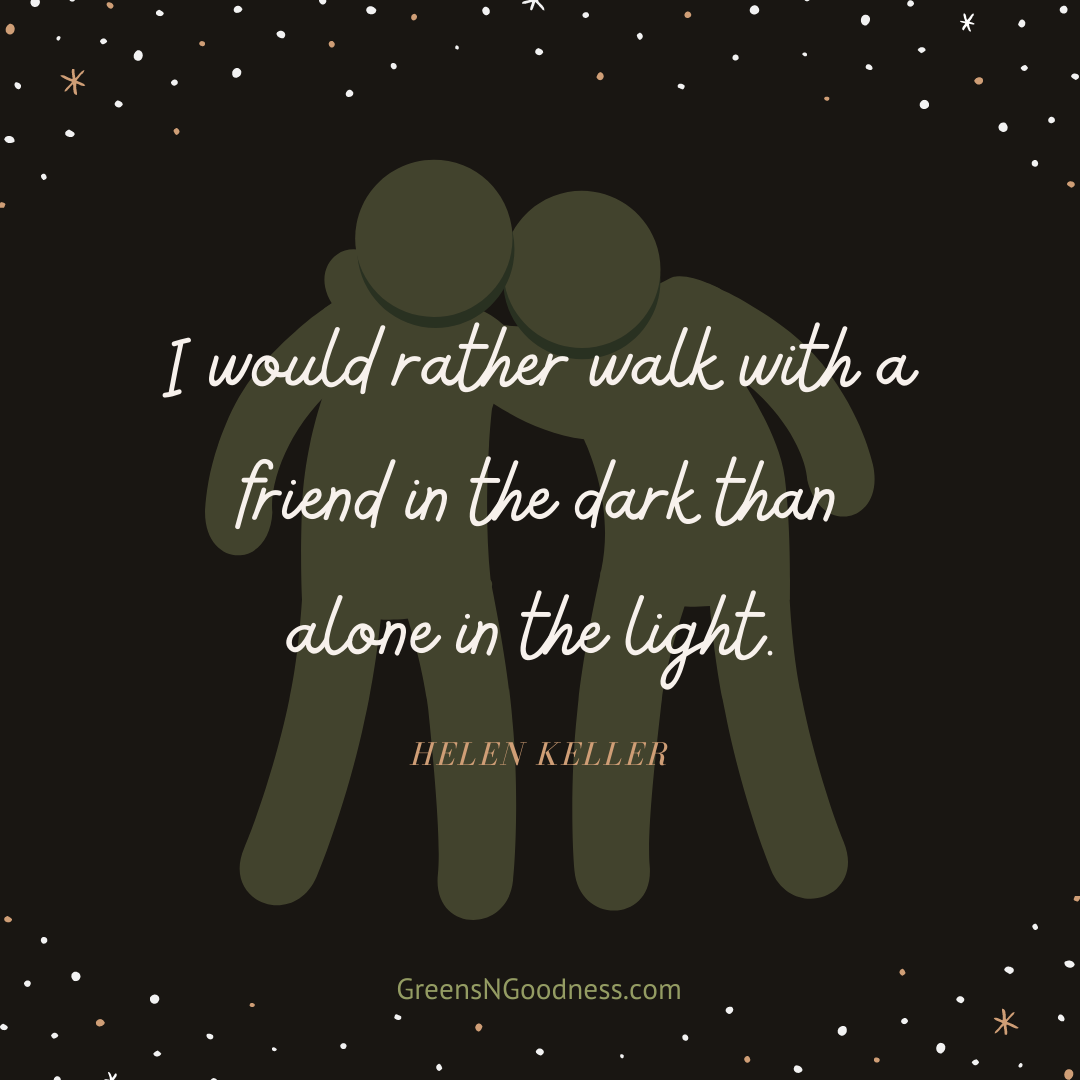
KNOW YOUR EMOTIONAL FREQUENCY
Of course, it is also important to recognize our personal boundaries. Radha Agrawal uses the term “emotional frequency” in her book, Belong (3). The term speaks to the fact that people, just like radios, pick up on different frequencies, depending on timing and location. Rather than judging a connection as negative or “bad vibes,” understanding this concept of “emotional frequency” can help us have more understanding and empathy for people, even if ultimately we do not want to pursue a close friendship.
As we age, making new friends becomes increasingly more challenging. We may already have established social circles and be less apt to put ourselves out there or go through situational shifts that create barriers to connection. Still, making friends as an adult is possible and can enrich your life in many ways, including exposure to new ideas, new perspectives and a diversity of experience. Knowing your emotional frequency can allow you to invest your energy where it will have the most benefit for you, and others.
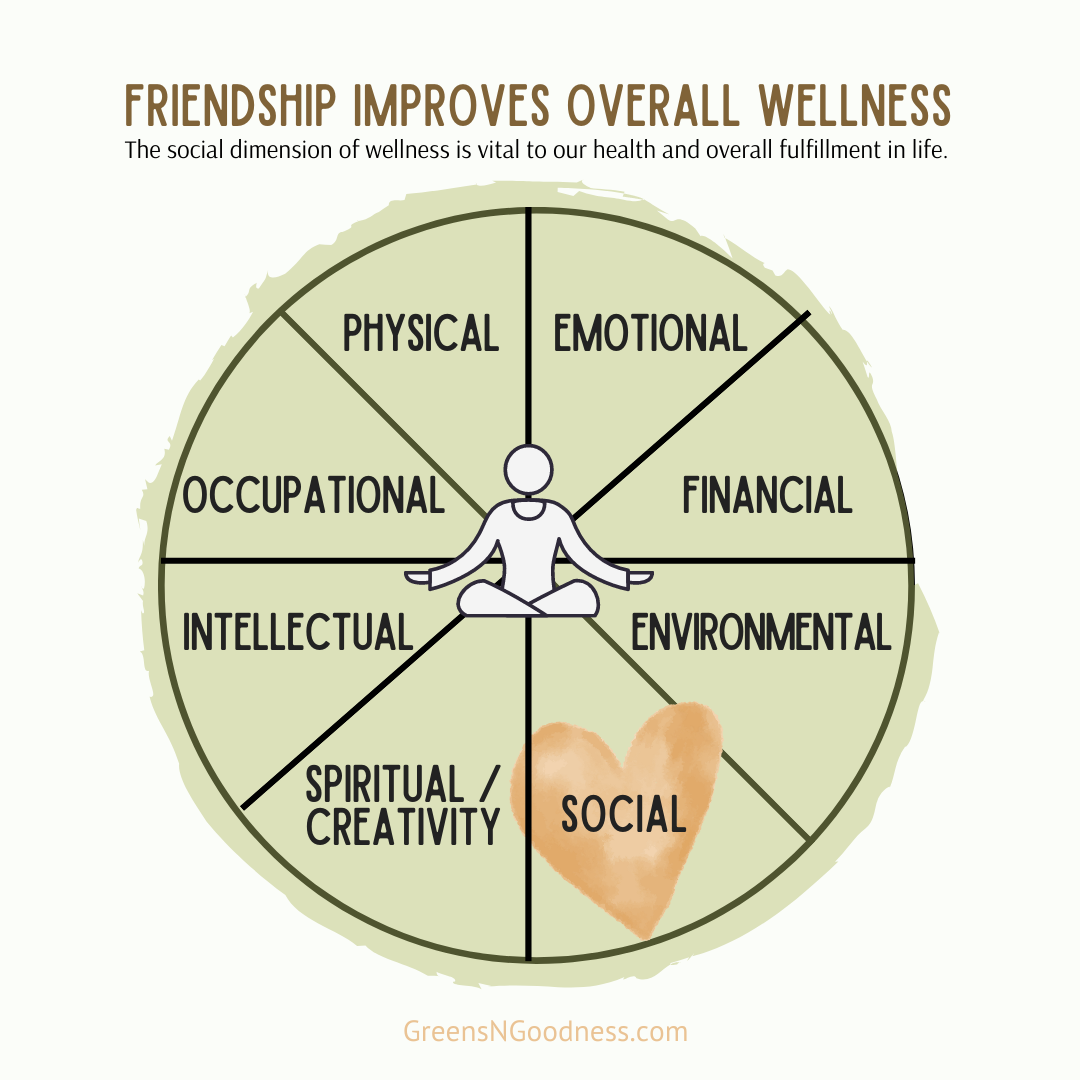
FRIENDSHIP IMPROVES OVERALL WELLNESS
The ability to form and maintain positive relationships and feel a sense of belonging and connectedness is encompassed in the social dimension of wellness. Creating connection with others requires developing and nurturing interpersonal skills, participating in social activities and building a strong network of family and friends. If you have felt that sense of inspiration or a “social high,” after getting the opportunity to connect more deeply with a group of friends, old or new, you know the value of that feeling for your emotional health.
The social dimension of wellness plays an important role in our mental and physical health and the degree to which we feel satisfied and fulfilled in life. Though we are likely to have phases in life where building relationships seems more challenging, or reconnecting with old friends feels impossible, we can’t dismiss the value of prioritizing creating connection with others and remember that, even though we can’t make old friends, all friends are valuable. Or, as the Girls Scouts say, “Make new friends, but keep the old, one is silver and the other gold.”
*******
References:
- Lu P, Oh J, Leahy KE and Chopik WJ (2021) Friendship Importance Around the World: Links to Cultural Factors, Health, and Well-Being. Front. Psychol. 11:570839. doi: 10.3389/fpsyg.2020.570839
- Parker, Priya. The Art of Gathering: How We Meet and Why It Matters. New York, Riverhead Books, 2018, p. 73.
- Agrawal, Radha. Belong: Find Your People, Create Community, & Live a More Connected Life. New York, Workman Publishing, 2018, pp. 80-81.2
